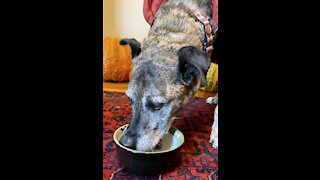Premium Only Content

NUTRITION FOR SENIOR DOGS.
NUTRITION FOR SENIOR DOGS.
In recent decades, greater control of infectious diseases, improved nutrition and the inclusion of dogs as part of the family have increased the life expectancy of dogs, which is increasingly leading to an increase in the number of senior dogs. The life expectancy of a dog is very variable depending on its size, for example, mini and small breed dogs tend to live longer than large and giant breed dogs, but in general, the average dog's life expectancy is approximately 13 years.
Advancing age can lead to a decline in the functional capacity of various organs, leading to specific symptoms depending on the organ affected, and these conditions require specific care. The senior dog may have problems associated with the heart, kidneys, joints, and a decline in natural defenses. Proper nutrition along with regular veterinary check-ups play a key role in preventing the most common diseases during geriatrics.
As far as nutritional care is concerned, the goal of a specific food for senior dogs is to maintain good health and proper body weight and condition. The aging dog tends to accumulate more body fat and lose muscle mass, and its metabolism is reduced. These systemic changes necessitate the provision of a specific diet containing fewer calories, more protein and less fat compared to adult dog food.
Because of the reduced metabolism and physical activity, the senior dog's caloric intake should be carefully controlled to ensure an adequate intake of nutrients and calories, while at the same time preventing the development of obesity.
In addition, it is important that senior dogs receive high quality protein at a sufficient level to provide the essential amino acids required for the body's maintenance needs and to minimize the loss of muscle mass that can occur . One should only restrict the protein supply if the dog has altered kidney function.
-
 2:04
2:04
KMTV
3 years agoCouncil Bluffs nonprofit cares for senior dogs
1 -
 0:16
0:16
North_of_49th_Parallel
3 years agoI love senior dogs ❤️
12 -
 LIVE
LIVE
TruthStream with Joe and Scott
12 hours agoSatan and Lucifer part 3, what is the difference? Inversion and Manipulation? A deep dive into an intriguing topic with Ethan Lucas, Restream #441
238 watching -
 8:07
8:07
Dr. Nick Zyrowski
6 days agoHigh Dose Vitamin D Increases Fat Loss & Muscle Growth - New Study
1.03K4 -
 4:13:41
4:13:41
The Pascal Show
17 hours ago $0.02 earnedDIDDY TRIAL LIVE! Jane Doe 'Victim #2' Defense CROSS! Diddy Trial Day 20
184 -
 2:00:03
2:00:03
MG Show
16 hours agoLA Riots Battle of the Narratives; Optics vs Reality
9.26K12 -
 1:23:40
1:23:40
The Chris Cuomo Project
21 hours agoWhy Scott Galloway Says the LA Protests HELP Trump
351 -
 58:05
58:05
SinCityCrypto
15 hours ago $0.01 earnedBitcoin Cools off as Ethereum Starts its Run!!
1151 -
 5:31
5:31
Congressman Eli Crane
13 hours agoDNA Profile Hacks Pose SERIOUS Exploitation Risk!
2843 -
 6:11
6:11
John Stossel
20 hours agoThe Extreme Right Goes Woke: How Some "Conservatives" Now Trash Freedom and Praise Karl Marx
5K50